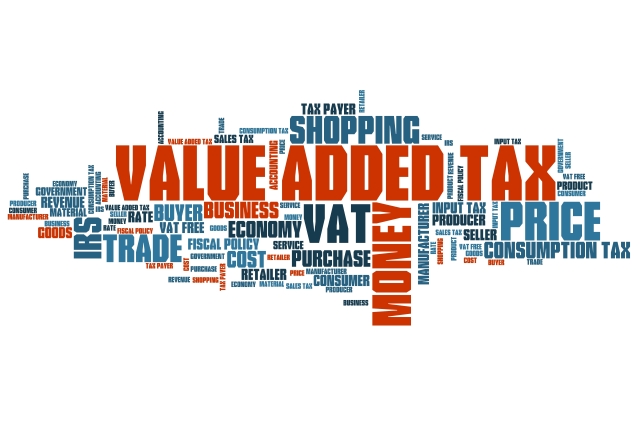Top 10 GCC VAT Questions You Should Know
Top 10 GCC VAT Questions You Should Know
Download the pdf file of Top 10 GCC VAT Questions You Should Know at the end of this post. The introduction of Value-Added Tax (VAT) is a paradigm shift for countries and companies based in the Gulf Cooperation Council (GCC). On the 1st of January 2018, both the United Arab Emirates (UAE) and the Kingdom of Saudi Arabia (KSA) introduced this new tax, leading this reform in the region. Bahrain is now on course to introduce VAT on the 1st of January 2019, followed by Oman and the remaining GCC countries.
With Bahrain’s 2019 deadline so close and others due to go live soon, companies have very little time to prepare for a new tax system that impacts every stage of an organization’s supply chain. Businesses, therefore, need to make their VAT readiness program a priority – focusing on their VAT policy, updating their risk profile, assessing their IT systems and considering a whole range of other elements as they prepare for their new tax obligations.
Pierre Arman, Market Development Lead for Tax & Accounting at Thomson Reuters, MENA, answers the 10 most common questions that businesses ask about the introduction of VAT in the GCC – advising businesses on the steps they can take to overcome challenges, as well as explaining the consequences of not being ready.
1. Where is VAT applicable? Is there any exemption?
The VAT is a broad-based consumption tax. This means it covers a wide range of goods and services in its tax net and the burden of this tax is borne by the final consumer. The VAT is also an indirect tax, which means it is remitted to the government by companies even though the government is not taxing companies but rather final consumers. This is in contrast with a direct tax, such as income tax, where the individual remitting tax to the government is the same individual that the government wants to tax.
Typically, each country has its own specifications about what is taxable under VAT; and we have seen countries in the GCC take different approaches when defining what is taxable, zero-rated and exempt under their respective VAT laws. However, a general trend worldwide is for certain products, such as luxury goods (cars, perfumes and so forth), to be taxable under VAT, while basic food elements and services such as education, healthcare and the provision of utilities (such as water, electricity) are usually either exempt or zero-rated.
2. Companies in the GCC are being advised to ‘take action’ now and prepare for the introduction of VAT. What step should be
taken first?
First and foremost, every company should engage with their tax advisor(s). Before organizations can plan for VAT, they need to understand its potential impact on their business. Companies need to gain insight into the tax treatment of all their day-to-day transactions, understand the impact of VAT on each function/department and identify the gaps between where they are now and where they need to be when VAT goes live in their countries of operation.
3. In practical terms, what are the compliance requirements under VAT for companies?
At a very high level, organizations need to be able to track and record VAT on every single transaction they undertake as a business, to show how much VAT they have either collected on sales (VAT output) or paid on purchases (VAT input). At the end of the period, which can be on a monthly or quarterly basis or even annually (typically for very small businesses), they summarize this information into a VAT return. This return then needs to be filed into the relevant government portal (or in some countries, delivered in paper form).
At a more strategic level, to achieve this goal and be fully compliant under VAT, every company needs to design a VAT policy, understand its risk profile, implement a compliance strategy and operational process, and finally review its existing IT systems. It’s also always good to remember that VAT is a self-assessed tax. This means that the government’s main interest is in the VAT return filed – the business is responsible for determining its own VAT liability. However, this also means that should the tax authorities challenge a company on a particular VAT return and that company is unable to justify certain key figures (because its compliance processes are not robust enough or its data is not detailed enough), that company could find it challenging to defend itself. This is not a pleasant position to be in.
4. How can companies ensure that their newly developed tax strategies are compliant with the VAT law?
The only sensible option here is to work with a tax advisor who has the dedicated VAT expertise and resources available to help a company understand how VAT might impact its business, as well as provide advice on how it can reduce its liability. This way, a company knows that its tax strategy and its VAT policy, procedures and controls have been reviewed and approved by a competent and independent party. This is very important from a risk management point of view.
5. What are some of the challenges currently faced by companies in the GCC as they prepare for VAT; and which areas should they invest in to ensure a smooth transition?
Two of the most striking challenges I’ve experienced when consulting with clients in the region are:
1. the lack of knowledgeable resources and,
2. the complex IT environment companies must deal with.
Most companies have legacy systems or in-house-built solutions that were never developed with tax in mind. Most of these systems are unable to cope with any VAT-induced logic needed to capture the correct tax treatment on each transaction.
In addition, the lack of knowledgeable resources leads to the assumption that the design of VAT systems is the responsibility of IT alone. This disconnection between the IT and finance/tax functions leads to multiple challenges down the line.
The IT team will never understand the type of data required to produce a VAT return if the finance/tax team does not provide guidance. The IT function must, therefore, work closely with the finance/tax function to ensure systems are fit for purpose with enough details available at a data level. This helps to avoid last-minute chaos when the VAT return is due to be filed. A key goal when preparing for VAT is for companies to future-proof their organizations. The processes and systems in place should be able to cope with the compliance obligations today, as well as where they are heading for tomorrow.

6. What are the implications for businesses not ready for VAT when it goes live?
The implications can be profound. Not being sufficiently prepared to manage VAT may see companies failing to comply with the VAT law of the country in which they operate. This could expose these organizations to fines, penalties and even jail time (in the case of Bahrain, for instance).
In 2017, people expected tax authorities to be lenient on companies with regards to VAT compliance. Unfortunately, this was not the case. It was reported1 that the General Authority of Zakat and Tax (GAZT) in KSA issued over 5000 orders for VAT violations during the first six months of 2018. There is therefore only one rule when it comes to VAT compliance: it’s better to be safe than sorry.
7. How will VAT impact GDP growth, inflation and investment behaviour in the GCC?
I strongly believe that VAT is a great opportunity for this region, as it will provide governments with a consistent source of revenue that can help them to diversify their commodity-based economies (i.e. those reliant mostly on oil and gas). If you also look at the economic impact, VAT is probably one of the least harmful taxes since it is – in theory – cost-neutral for businesses (if managed correctly). It also drives job creation in multiple countries.
Only time will tell how VAT will truly impact economies in the GCC. That said, investors should see the region’s VAT introduction as a sign of stability and willingness to move away from a commodity-centric economic model, which can be extremely volatile as we have witnessed in recent years.
8. What are the potential factors that determine the success of the implementation of VAT?
The VAT is a duty on both sides of the equation. Thus, its success should be looked at from both a government and taxpayer point of view. On one hand, a clear key performance indicator (KPI) for governments is how much VAT is collected throughout the fiscal year and how much it is contributing to the overall GDP. Most countries in the region, with a VAT rate of 5%, expect to see between 1.5% to 2% of GDP contribution coming from VAT2.
On the other hand, KPIs for taxpayers are focused on how easy it is for any company to be VAT compliant –for example, the amount of time spent producing each VAT return, the amount of manual effort required to produce accurate figures, and the amount of VAT that can be recovered as opposed to the amount eligible for recovery in that period. Finally, VAT is a journey; and both sides of the equation will continue to improve as time goes by. Governments will become more accurate and astute in refining VAT policies and enforcing compliance, while companies will learn how to produce VAT returns more efficiently and accurately.
9. What can be learned from the VAT experiences in other Arab countries, such as Egypt?
One of the main lessons we have learned from VAT introduction initiatives worldwide is that they generate a substantial revenue stream for governments. At the same time, VAT represents a paradigm shift for companies, who must devote more resources to VAT management and compliance; and adjust their processes and infrastructures accordingly. If we take Egypt as a recent example, a lesson learnt there is the importance of clearly communicating the major legislative change to the market, well enough in advance. Egypt introduced VAT on the 7th of September 2016 with an active date of 8th of September 2016, without publishing the VAT executive regulations3. This was obviously an immense challenge for Egypt’s business community. As a government, the last thing you want is to put companies at risk of non-compliance because they’re not aware of (or do not fully understand) the new tax legislation.
10. Which sectors will be most affected by the introduction of VAT?
All sectors will be affected by VAT, no matter whether they are caught in the VAT net or branded as an exempt, zero-rated or out-of-scope industry (each country might have a different approach). People tend to view VAT as a problem only for industries taxable whereas exempted or zero-rated sectors do not have to worry about it. This, however, could not be further from the truth. All sectors are concerned, and exempted sectors will be the ones the most impacted (Banking typically in the GCC is partially exempted). This is also true at the company level: all departments will feel the ripple-effects – from operations to human resources. In this context, all businesses should gain an understanding of how VAT will affect them and start preparing for effective VAT compliance. The adage has never been so true – “failing to plan is planning to fail”.







